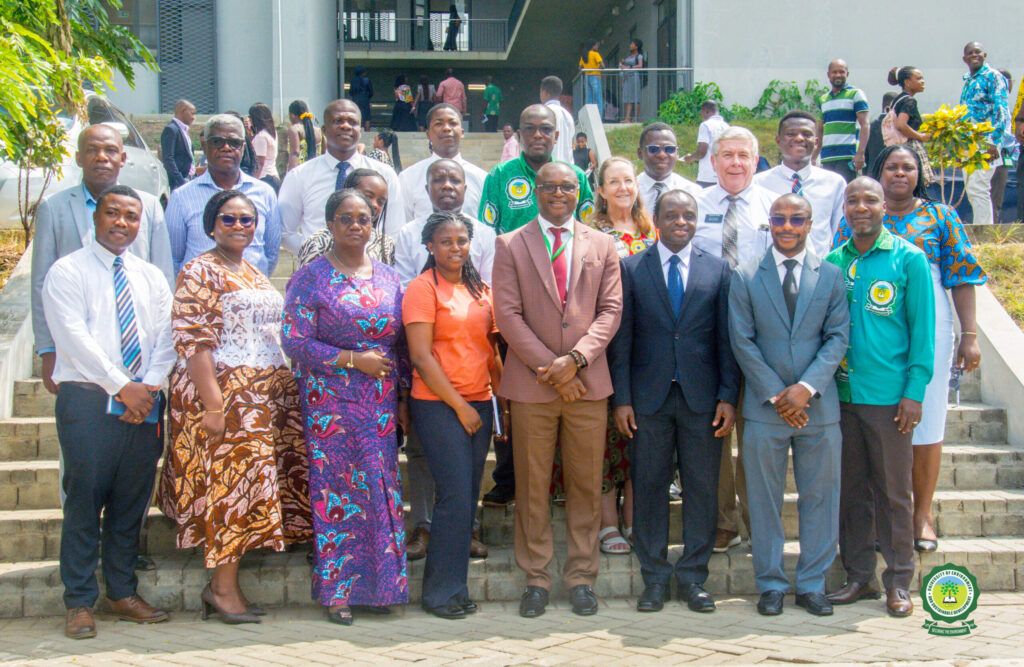UESD Benefited from a Green ICT Lab Donated by The Church of Jesus Christ of Latter-day Saints

The University of Environment and Sustainable Development (UESD) in Somanya, Eastern Region, Ghana, has taken a significant step towards promoting sustainability and modern education with the donation of a 60-seater ICT laboratory by The Church of Jesus Christ of Latter-day Saints. The newly inaugurated ‘N-Computer Lab’ is designed to integrate energy-efficient technologies in line with the university’s mission to foster sustainable educational practices and research.
The official handover ceremony, held on January 29, 2025, was a momentous occasion, attended by university officials, church representatives, students, and dignitaries. The N-Computer Lab is equipped with 60 energy-efficient computers, a smart board, two servers, an industrial UPS, and various other accessories, all carefully selected to minimize environmental impact. This modern facility is expected to provide students with hands-on training in digital literacy, research, and innovative technology.
Mary Agyepong, the Registrar and Director of UESD, expressed profound gratitude for the donation during her address at the ceremony. She highlighted the importance of integrating Information and Communication Technology (ICT) into education, which she believes is essential for driving social and economic transformation. Agyepong stressed that the N-Computer Lab would enhance students’ learning experiences by providing them with the skills necessary for the digital era, thus making a significant contribution to their academic and professional development.
In his remarks, UESD’s Vice-Chancellor, Professor Eric Nyarko-Sampson, underscored the vital role of green computing in shaping a sustainable future. He described the donation as the largest single contribution ever made to the university by any individual or organization, emphasizing its significance for both the university and the broader community. Nyarko-Sampson pointed out that the N-Computer Lab’s green computing infrastructure perfectly aligns with the university’s environmental mandate, further reinforcing the institution’s commitment to promoting eco-friendly solutions. He noted that the lab would play an essential role in ICT education while minimizing environmental harm through its energy-efficient design.
The N-Computer Lab’s innovative approach to education reflects a global shift toward sustainable digital solutions. The facility’s energy-efficient hardware, responsible power consumption, and sustainable practices in managing electronic waste are all part of an effort to reduce carbon footprints in computing. These efforts contribute to a larger movement toward sustainability, not just in Ghana, but also across the world, as more institutions strive to integrate green technologies into their infrastructure.
Elder Samuel Annan Simons, Area Seventy for The Church of Jesus Christ of Latter-day Saints, spoke about the church’s commitment to education and sustainability during the ceremony. He emphasized that the church’s focus on fostering sustainable development aligns with its broader mission to support initiatives that benefit communities. Elder Simons expressed his belief that green computing is the future of technological innovation and was proud of the church’s contribution to UESD’s mission of promoting environmentally conscious education. He concluded by reiterating the church’s commitment to doing good by helping students develop the skills they need to thrive in the modern world while maintaining a focus on environmental stewardship.
Following the official handover, guests, faculty members, and students were given a guided tour of the N-Computer Lab. During the tour, attendees were introduced to the principles of green computing and educated on how to use the facility responsibly. The university has emphasized the importance of maintaining the sustainability of the lab, ensuring that its resources are used in a way that maximizes educational benefits while minimizing the environmental impact.
UESD’s new N-Computer Lab is poised to become a hub for digital education, research, and environmental awareness. This initiative places the university at the forefront of eco-friendly technological advancements in Ghana, allowing students to gain crucial skills in a sustainable and energy-efficient environment. Moreover, the lab is set to serve as a model for other educational institutions in the country and beyond, demonstrating that technological progress and environmental sustainability can go hand in hand. The donation marks a significant milestone in UESD’s commitment to providing students with the tools and knowledge they need to succeed in an increasingly digital world while also contributing to a greener, more sustainable future.






